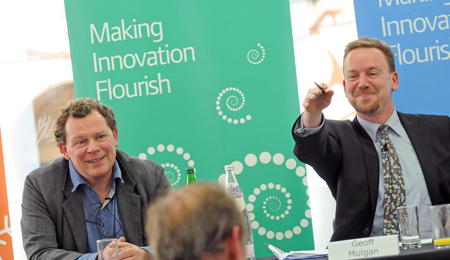
Conservative Party Conference: Cultural Value – creative industries in a digital world. Tuesday 4 October 2011, Lecture Room, Manchester Art Gallery

Chair: Geoff Mulgan, NESTA CEO The Hon Ed Vaizey MP, Minister for Culture, Communications and Creative Industries Peter Tullin, Co-founder, Culture Label Charles Hunter, Executive Director, Mudlark NESTA (National Endowment for Science, Technology and the Arts) have again been holding court throughout the political conference season, hosting a series of discussions on business and the arts. The one session that has manifested at all three main conferences this year has been Cultural Value – creative industries in a digital world.
Effectively chaired by NESTA CEO Geoff Mulgan, the Manchester session gave Peter Tullin, Charles Hunter and Ed Vaizey the opportunity to discuss how could new technologies could be embraced by creative organisations to engage prospective audiences and create new artistic and entrepreneurial opportunities?
Charles Hunter explained how his company Mudlark, who won acclaim with their contemporary scripting of Romeo & Juliet played out on Twitter, base their creative output on working with new technologies that users can interact with. Mudlark’s are currently working with ‘Four Square’ technology manipulating existing components in Oyster travel cards to enable the card to act as a tracker for customers. Interestingly, Hunter admitted that Transport for London has often been uncooperative in development of the project.
Peter Tullin of Culture Label gave an assured talk, placing emphasis on his entrepreneurial approach in utilising online technologies to identify a profitable niche in the sale of art online while making a sustained investment in the arts. Having identified a lack of online merchandise for institutions for the ICA, Tullin described how Culture Label actively aggregated a portfolio of cultural organisations without online shops in the UK and created this service for them. His well-rehearsed party trick line, that IKEA is the biggest seller of ‘art’ in the world, drew a collective murmur that must hit the spot every time. Building a solid brand and making initiatives accessible was his interest, a pop at his perception of the Own Art scheme rendered ineffective by its overly bureaucratic procedure.
Tullin gave numerous examples that backed up his argument that online technologies can open up new audiences in the arts. A key example is the Google Art Project digitalising select works and using Google’s feted ‘street view’ within major galleries such as the Louvre. Ed Vaizey emphasised the changing landscape acknowledging the age of self-publishing and content generation by users. Vaizey’s key message, that technology and culture need to be at the heart of government ‘technological’ revolution, was backed by examples of NESTA’s work and the need for the Arts Council to actively embrace technology in their working methods. A Q&A session touched on a few issues; the most intriguing being a question regarding the 2003 Legal Deposit Libraries Act, a stalled act concerning website archiving and protection. Ed Vaizey commented that the amended act is still to be presented but is hopeful of a conclusion.